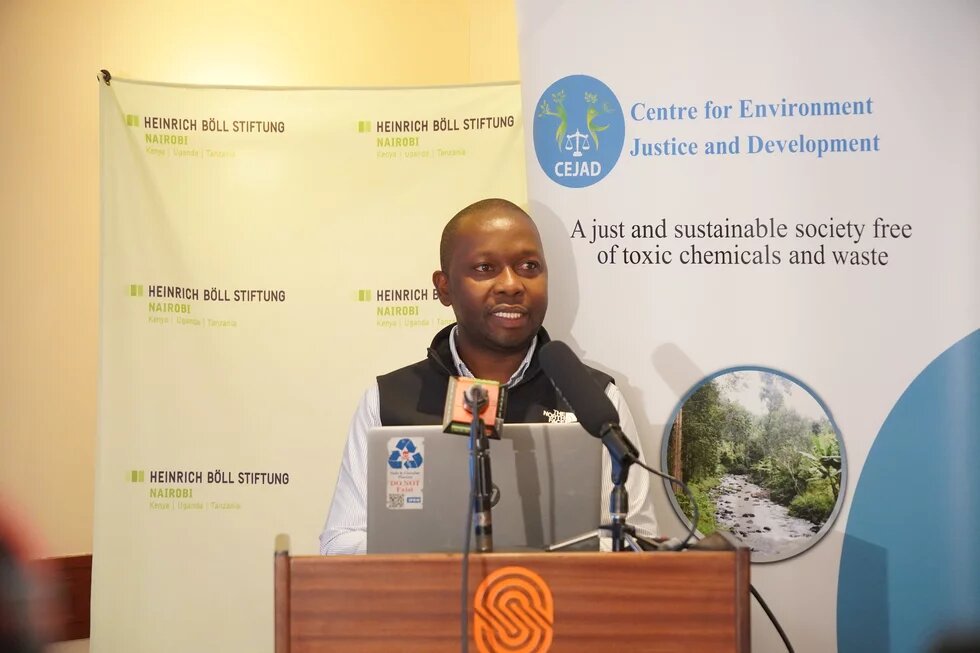Nairobi, Kenya, November 19, 2024– Kenyan civil society organizations, led by the Centre for Environment Justice and Development (CEJAD) and Heinrich Böll Foundation Nairobi, have urged African leaders to unite in demanding decisive action to reduce production of plastics and eliminate hazardous chemicals in plastics throughout their lifecycle.

Kenya CSOs Call for African Solidarity in calling for Reduction of Primary Plastics Production and Elimination of Hazardous Chemicals in Plastics at INC-5.
Nairobi, Kenya, November 19, 2024– Kenyan civil society organizations, led by the Centre for Environment Justice and Development (CEJAD) and Heinrich Böll Foundation Nairobi, have urged African leaders to unite in demanding for decisive action to reduce production of plastics and eliminate hazardous chemicals in plastics throughout their lifecycle.
At a media breakfast held in Nairobi ahead of the Fifth Intergovernmental Negotiating Committee (INC-5) on the Global Plastics Treaty in Busan, Korea, Griffins Ochieng, Executive Director of CEJAD, emphasized the importance of solidarity among African nations.
“African Countries as net importers bear the brunt of plastic pollution” said Ochieng. "Previous negotiations have seen petrochemical companies dominate the discussions, sidelining the voices of High Ambition Countries. It’s time for African leaders to stand united and demand a treaty that prioritizes eliminating hazardous chemicals, ensures transparency, and includes mechanisms for, labeling, tracking, monitoring, and data-sharing.
"Globally, plastic production has more than doubled in the last 15 years, with global output reaching 400 million tonnes annually. Less than 10% of this plastic is recycled, leaving waste to accumulate in ecosystems, harming biodiversity, and burdening marine and terrestrial environments. Plastic pollution is not just an environmental issue but also a climate, health, and social justice crisis.
The CSOs emphasized the need for a global solution for plastic pollution. They strongly urged for a legally binding instrument that addresses the full life cycle of plastics with direct, definitive and obligatory language to ensure that provisions set by the treaty create mandatory binding obligations on its Parties.
“We are facing a global plastics crisis with global production significantly outpacing our ability and capacity to soundly and sustainably manage our waste” added Griffins”. “An approach based on national rules would make the Treaty largely ineffective. Global legally binding measures would instead create a level playing field for all countries and economic actors and ensure that meaningful global mechanisms exist to reduce plastic production.
”Waste pickers are disproportionately affected, despite their significant contribution to plastic collection, sorting and recycling of plastics in many countries, especially those in the informal sector. Women waste pickers in particular are especially vulnerable. In Kenya alone, women represent a substantial number of between 40% - 50% of waste pickers in urban areas like Nairobi, Kisumu, and Mombasa. Laws and policies that safeguard their wellbeing and economic status are most often ignored.
Joyce Wangari, a waste picker from Nairobi Recyclable Waste Association, urged leaders to champion policies that protect informal workers: “African leaders must ensure that a just transition for waste pickers is captured in the treaty. This includes access to safe, dignified, and regulated employment, skill development, fair wages, and social protections.
”Available and adequacy of the existing funding mechanisms of the implementation of the Plastic treaty was also discussed. A robust international treaty will require a predictable, and sustainable financing mechanism that includes a dedicated multilateral fund. The funding model should also ensure that financing of the implementation of the treaty is shouldered by the polluting countries.
“Currently the Global Environment Facility (GEF) and the Green Climate Fund (GCF) are not an adequate pool of financing for the implementation of the Plastic Treaty”, stressed Dorothy Otieno, Programme Officer at CEJAD. The future Treaty must be able to mobilize sufficient and appropriate funding to support a just transition and enable developing countries to comply with the treaty provisions. The negotiations on financing should also consider methods based on the polluter pays principle and ensure that the costs of the impacts of plastics are absorbed by the producers.
Kenya has been a vocal supporter of a high-ambition treaty addressing the entire lifecycle of plastics, from production to disposal. As the final INC meeting takes place from November 25 to December 1, 2024, African leaders have the opportunity to strengthen their collective position and demand decisive action.
Faiba Kombo, Communication Programme Coordinator, Heinrich Böll Foundation, noted, “This is a critical moment for Kenya and Africa to listen to their civil societies and jointly champion a treaty that addresses the global plastics crisis and ensures the protection of our people’s health and environment.”
This press release was circulated and published in the Kenyan media.